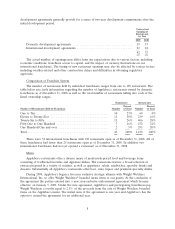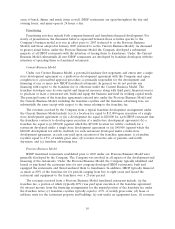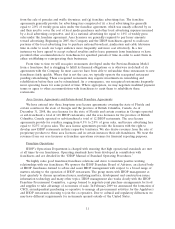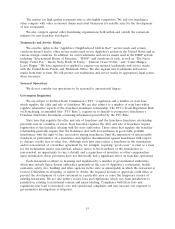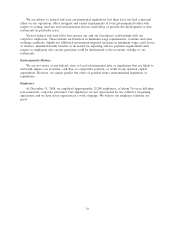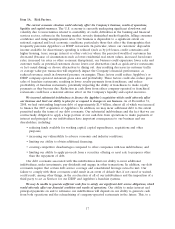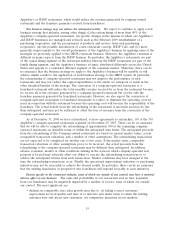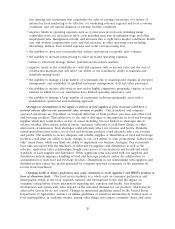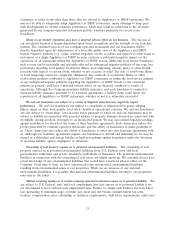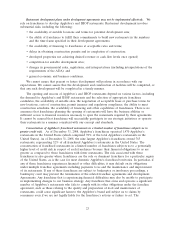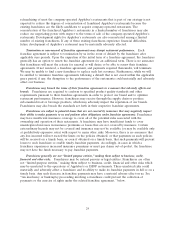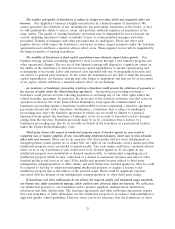IHOP 2008 Annual Report Download - page 29
Download and view the complete annual report
Please find page 29 of the 2008 IHOP annual report below. You can navigate through the pages in the report by either clicking on the pages listed below, or by using the keyword search tool below to find specific information within the annual report.The market for high quality restaurant sites is also highly competitive. We and our franchisees
often compete with other restaurant chains and retail businesses for suitable sites for the development
of new restaurants.
We also compete against other franchising organizations both within and outside the restaurant
industry for new franchise developers.
Trademarks and Service Marks
We own the rights to the ‘‘Applebee’s Neighborhood Grill & Bar’’ service mark and certain
variations thereof and to other service marks used in our Applebee’s system in the United States and in
various foreign countries. In addition, we own trademarks and service marks used in the IHOP system,
including ‘‘International House of Pancakes,’’ ‘‘IHOP’’ and variations of each, as well as ‘‘The Never
Empty Coffee Pot,’’ ‘‘Rooty Tooty Fresh ‘N Fruity,’’ ‘‘Harvest Grain ‘N Nut,’’ and ‘‘Come Hungry,
Leave Happy.’’ We have registered or applied to register our material trademarks and service marks
with the United States Patent and Trademark Office. We also register new trademarks and service
marks from time to time. We will protect our trademarks and service marks by appropriate legal action
when necessary.
Seasonal Operations
We do not consider our operations to be seasonal to any material degree.
Government Regulation
We are subject to Federal Trade Commission (‘‘FTC’’) regulation and a number of state laws
which regulate the offer and sale of franchises. We are also subject to a number of state laws which
regulate substantive aspects of the franchisor-franchisee relationship. The FTC’s Trade Regulation Rule
on Franchising, as amended (the ‘‘FTC Rule’’), requires us to furnish to prospective franchisees a
Franchise Disclosure Document containing information prescribed by the FTC Rule.
State laws that regulate the offer and sale of franchises and the franchisor-franchisee relationship
presently exist in a number of states. State laws that regulate the offer and sale of franchises require
registration of the franchise offering with the state authorities. Those states that regulate the franchise
relationship generally require that the franchisor deal with its franchisees in good faith, prohibit
interference with the right of free association among franchisees, limit the imposition of unreasonable
standards of performance on a franchisee and regulate discrimination against franchisees with respect
to charges, royalty fees or other fees. Although such laws may restrict a franchisor in the termination
and/or non-renewal of a franchise agreement by, for example, requiring ‘‘good cause’’ to exist as a basis
for the termination and/or non-renewal, advance notice to the franchisee of the termination or
non-renewal, an opportunity to cure a default and a repurchase of inventory or other compensation
upon termination, these provisions have not historically had a significant effect on franchise operations.
Each restaurant is subject to licensing and regulation by a number of governmental authorities,
which may include liquor license authorities (primarily in the case of Applebee’s restaurants), health,
sanitation, safety, fire, building and other agencies in the state or municipality in which the restaurant is
located. Difficulties in obtaining, or failure to obtain, the required licenses or approvals could delay or
prevent the development of a new restaurant in a particular area or cause the temporary closure of
existing restaurants. We are also subject to new laws and regulations, which vary from jurisdiction to
jurisdiction, relating to nutritional content and menu labeling. Compliance with these laws and
regulations may lead to increased costs and operational complexity and may increase our exposure to
governmental investigations or litigation.
15





